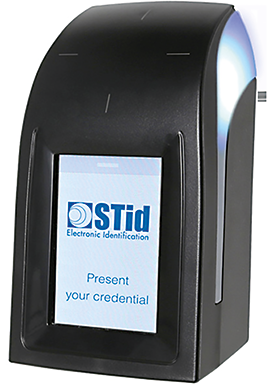

IMeBIO was founded in December 2008. It designs, develops, manufactures and sells innovative mobile labs, in particular BSL2 and BSL3 biosafety labs designed for all sectors needing to study and analyse pathogens, whether associated with health risks, pandemics or bioterrorism. Security therefore needs to be optimal.
These confined spaces need to be quick to set up, anywhere in the world, especially in countries where virulent strains can appear. Users therefore need to be able to manage a mobile laboratory independently, remaining in control of security settings.
IMeBIO has to implement access control, not just for the end-to-end security of its mobile microbiology labs, but also in order to protect community health by limiting infection risks. Users need independent security management at all times, anywhere in the world. They need to be able to respond instantly to all critical situations in order to avoid health disasters.
As well as the question of security, IMeBIO needs many applications to be integrated within the access reader, such as a key information display, in order to reduce the amount of equipment to be used and the cost of the solution.
“The implementation of a multifunctional reader enables us to add auxiliary functions on a single device, simplifying daily operations for lab staff facing multiple uses and optimising costs,” explains Jean-François Jung, director, IMeBIO.
Secure and reliable identification
The STid solution with its Architect touchscreen RFID readers, SSCP communication protocol and silicone wristbands was selected to secure the mobile labs.
The 13.56 MHz MIFARE Architect reader with display offers optimal data security systems, using recognised public security algorithms that comply with the recommendations of the French Network and Information Security Agency (ANSSI):
• Open, non-secret protocol.
• Cryptography using public algorithms.
• Reader authentication (session keys).
• Signature, encryption.
• User keys management.
• Selection of communication method and security level (plain text, signed, encrypted, signed and encrypted).
In order to guarantee end-to-end authentication, the STid SSCP communication protocol has been integrated into Architect readers to ensure security between the reader and management system. This protocol encrypts data (AES) and provides mutual reader-controller authentication prior to any communication.
Multiple functions in one reader
IMeBIO also selected the RFID Architect touchscreen reader for its indicator lights and audio signals that manage user information in real time. The buzzer acts as an alarm if a door has been open for more than 10 seconds, alerting staff to a possible security breach.
The solution developed is much more than an RFID reader for identifying authorised personnel. The touchscreen provides two key functions:
• Display: checks whether safety conditions have been complied with by displaying the pressure levels in the airlocks and laboratories, and checks for open doors. It can also display the company logo to promote brand image.
• Touchscreen: a button can be added to the screen to act as a doorbell or door release button. It can also display a keypad used for authentication or for activating auxiliary functions such as alarms.
Multi-coloured LEDs also give users visual information, notifying them of access authorisation, an open door, or a decontamination operation that is underway, etc.
Independence and control
The STid SSCP solution uses tried-and-tested, and approved public security algorithms. This open software is compatible with all access control systems. STid uses tools that enables it to manage mobile lab security independently. IMeBIO needs to be able to respond quickly for emergency action in difficult situations. The company is not dependent on STid to upgrade its system and security settings in response to real-time needs.
“It is essential to have an open solution that is easy to install so that it can be implemented in any corner of the globe, whether the laboratory is connected to the mains supply or an independent power generator, in tropical regions such as the Amazon rainforest or Cameroon, or in dryer places such as Mali,” says Jung.
Staff and community protection
By choosing the STid access solution, IMeBIO ensures staff and community protection, without compromising on correct mobile lab security procedures, throughout the world.
Architect readers and the SSCP communication protocol offer the highest levels of security, and provide numerous possibilities for integrating auxiliary functions, such as a key information display, buttons, keypads, and indicator lights and audio signals, etc. The RS485 serial link can be used to easily connect the reader to any type of machine.
“The STid solution helps us secure our laboratories and protect human lives, while offering other benefits. The multifunctional readers considerably reduce integration, cabling and installation costs, and save space. We have halved the number of machines we use and saved on 140 cables per laboratory,” says Jung.
Finally, doing away with mechanical keys has reduced the replacement costs by a factor of 100. If a badge is lost, it can be cancelled in real time and a new one sent out.
“Implementing an access solution to secure mobile laboratories needs to address the issues of security, multiple applications and technological openness. This kind of solution needs to adapt to any type of environment and constraint in order to ensure security for all. Thanks to IMeBIO, we are able to make a small contribution to the fight against infection disease. It is also interesting to see our readers used in extremely difficult regions such as Amazonia, Mali or Cameroon,” concludes Vincent Dupart, STid CEO.
For more information contact Evolving Management Solutions,
This case study was published by STid at https://stid-security.com/images/documents/corporate_presentation/26_Etude-de-cas-STid-IMEBIO_US_v1.00.pdf (short link: www.securitysa.com/*ems2).
| Tel: | +27 11 274 6665 |
| Email: | [email protected], [email protected] |
| www: | www.emssa.net / www.commend.co.za |
| Articles: | More information and articles about Evolving Management Solutions |

© Technews Publishing (Pty) Ltd. | All Rights Reserved.